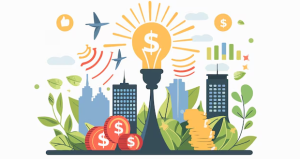Managing your household expenses efficiently is crucial, especially nowadays. One area where many Americans can see significant savings is their monthly energy and utility costs. Understanding how to optimize the use of electricity, natural gas, and water can lead to substantial financial benefits.
Here are some effective tips for saving on energy, which not only lessen your financial burden but also contribute positively to environmental sustainability. By making small adjustments to your daily habits, you can significantly reduce your energy consumption and carbon footprint.
Understanding your energy consumption

To effectively start reducing your utility expenses, it’s important to first comprehend how energy is used in your home. Begin by evaluating your monthly utility bill; look for patterns in consumption across different seasons. Most homes see spikes in air conditioning use during the summer and heating during the winter. Once these patterns are identified, you can take targeted actions.
Consider using smart meters or energy tracking apps to get real-time data on your energy usage. These tools provide insights into when and how you consume energy the most. By recognizing times of peak consumption, it becomes easier to implement changes. Understanding your consumption patterns is the foundation for effective energy management.
Investing a bit of time in assessing and understanding your household’s energy footprint is a small step that leads to bigger savings. Knowing where the most energy is being used is crucial. This insight allows for informed decisions about where to make the biggest changes. Investing in energy-efficient appliances or implementing specific usage strategies all start here.
Optimizing heating and cooling systems
Transitioning to more efficient heating and cooling practices can lead to considerable reductions in your utility bills. Begin by investing in a programmable thermostat. This allows you to set your heating or cooling system to run less when you’re not home or during sleeping hours, leading to substantial annual savings.
Regular maintenance of your HVAC systems is another key to efficiency. Ensure filters are routinely changed, ducts are sealed, and system components are checked for efficiency. An optimized system doesn’t have to work as hard, using less energy over time. These proactive measures prevent future costly repairs, extending the life of your systems.
Moreover, sealing your home properly ensures that the heating and cooling efforts are not wasted. Insulating your attic and walls, caulking windows, and repairing any seals can drastically reduce the loss of conditioned air. This ensures your systems run efficiently, providing comfort without excessive energy use.
Enhancing appliance efficiency
One major step in cutting down on your utility bills is by maxing out the efficiency of your appliances. Start by replacing old, inefficient machines with modern Energy Star-rated models. These appliances are designed to use significantly less energy, without compromising performance, saving you money in the long haul.
Routine maintenance also plays a vital role; for instance, keeping your refrigerator coils clean ensures it runs smoothly without unnecessary energy output. Similarly, regularly cleaning dryer vents enhances its efficiency, cutting down on the time and energy needed per load. Small steps can lead to substantial savings over time.
Don’t overlook the importance of energy-efficient lighting. Transitioning to LED lights is a simple yet effective way to reduce electricity usage significantly. LEDs use a fraction of the power that traditional incandescent bulbs do and have a much longer lifespan. Implementing these changes is a straightforward path toward lowering your monthly expenses.
Water-saving strategies
Reducing water usage is another effective method to lower utility bills. Start by installing low-flow faucets and showerheads. These fixtures significantly cut water usage without compromising pressure. Such efficiency measures can lead to noticeable reductions in monthly water consumption.
In addition, be mindful of your water heating practices. Lowering the thermostat on your water heater to a more moderate temperature reduces the energy needed to maintain the heat. Furthermore, washing clothes in cold water when possible not only saves energy but also extends the life of the garments.
Implementing a rainwater collection system for use in garden irrigation also lessens your need for tap water. Similarly, fixing leaks promptly prevents unnecessary water loss. These initiatives collectively contribute to both lower utility bills and a more sustainable way of living.
Behavioral changes for energy savings
Simple behavioral changes can also play a huge part in energy conservation. Cultivate the habit of turning off lights and unplugging devices when not in use. Many electronics consume energy even when switched off if they’re still plugged in, a concept known as “phantom load.”
Encourage family members to adopt practices such as shorter showers or running dishwashers and washing machines only with full loads. These small daily practices, when consistently followed, can lead to significant yearly savings on your utility bills. Changing daily habits can sometimes offer the quickest returns.
Lastly, educate yourself and your family about the importance of energy conservation and its impact on the environment. Creating awareness can motivate everyone to contribute to saving energy, benefiting both your wallet and the planet. Behavioral changes are as vital as technological upgrades in reducing energy consumption.
